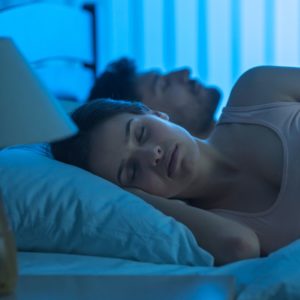How Do I Manage Obstructive Sleep Apnea?

Obstructive sleep apnea happens because something is narrowing the airway, making it difficult for air to pass through. When airflow is challenged, we hear snoring. This can happen because the tongue falls back when relaxed and blocks the airway. It can happen because of the weight of relaxed neck and throat muscles. When the airway becomes blocked, snoring stops because breathing stops. When breathing stops, the brain activates the release of adrenaline. This lightens sleep enough to restart breathing. When breathing resumes, it may do so as a choke or gasp.
Can Sleep Practices Help Obstructive Sleep Apnea?
People with obstructive sleep apnea often want to improve their condition without medical intervention. Common suggestions for managing sleep include:
- Sleep on one side or the other. This can prevent the tongue from falling into the airway when it relaxes. To prevent rolling onto the back, some people affix a tennis ball to the back of their pajamas or wedge a pillow behind the back. This is necessary until the body has been retrained not to sleep on the back.
- Sleep with the head elevated. Elevating the head four to six inches with multiple pillows may also keep the tongue from blocking the airway.
- Attend to the nasal passageways. Nasal sprays or dilators may reduce snoring and breathing problems.
- Tone the muscles that keep the mouth closed. This can be done by chewing gum or “exercising” the jaw by holding a pen between the teeth for a few minutes before bedtime.
Several strategies are suggested for people with obstructive sleep apnea. However, there is no way to predict what may work and what may not. Obstructive sleep apnea is a potentially serious condition that requires specific care. Eos Dental Sleep in Philadelphia specializes in comfortable oral appliance therapy for obstructive sleep apnea. For more information regarding this proven modality, call (215) 241-0700.
